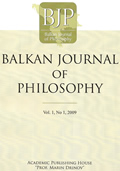The Principle of Common Cause and its Advantages and Limitations in Screening the Correlated Events off
The Principle of Common Cause and its Advantages and Limitations in Screening the Correlated Events off
Author(s): Joby VargheseSubject(s): Philosophy, Logic, Special Branches of Philosophy, Philosophy of Mind, Philosophy of Science
Published by: Институт по философия и социология при БАН
Keywords: Common Cause Principle; screening off; correlated events; limitations of the PCC; Causal Markov Condition
Summary/Abstract: The Principle of Common Cause (PCC) puts forward the idea that events which occur simultaneously and are correlated have a prior common cause which screens off the correlation. I endorse the view that the PCC does qualify as a principle that can be used as a tool in explaining improbable coincidences. However, though there are epistemological advantages in common cause explanations of correlated events, the PCC is not impeccable. This paper offers a preliminary assessment of the PCC advocated by Reichenbach, and then attempts to illustrate three scenarios in which the principle might be inadequate in explaining correlated events. The paper also compares the Common Cause Principle and the Causal Markov Condition (CMC), and examines the advantages of CMC over the Common Cause Principle.
Journal: Balkan Journal of Philosophy
- Issue Year: IX/2017
- Issue No: 1
- Page Range: 71-78
- Page Count: 8
- Language: English

